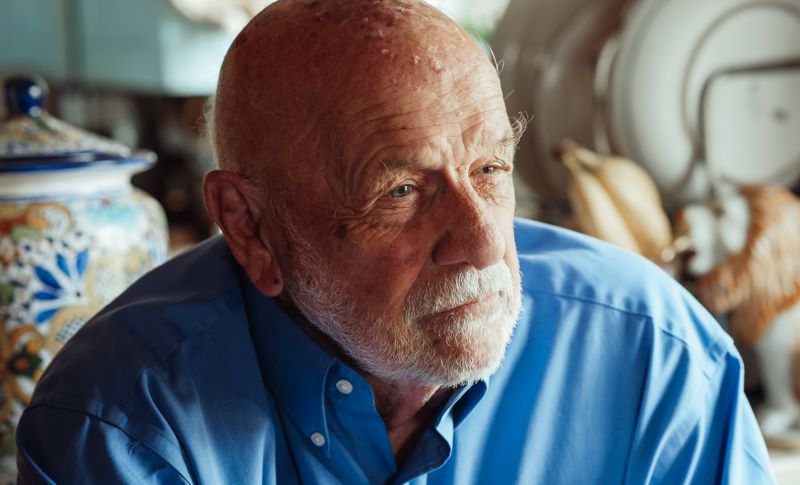I take my 3-year-old granddaughter to see her 84-year-old grandpa. He has dementia and loves cake, so Daisy and I bring along a passionfruit sponge cake with pale yellow icing. Michael is unusually bright and happy when we arrive. He’s had a shower today and his eyes soften when Daisy runs into the room. He puts out his arms to hug her. Daisy lunges at his leg and gives it a quick hug but she’s in a hurry to show him her new dance and anyway grandpa can sometimes use his “big voice” when he’s having a bad day. She’s cautious.

[This is a guest post by Nora Vitins psychologist, writer and creator. Find more from Nora on her blog viva70.com and on Instagram https://www.instagram.com/viva70mag/ ]
Michael heads to the piano to play some Broadway standard and sings loudly. Daisy counters with a Wiggles song and swirls and twirls in her new ballet shoes. Let the mayhem begin! I lay out the cake on a plate and head to the kitchen to make some tea and gather some plates. The music has stopped, and I hear momentary stillness. Daisy then starts yelling something in her tiny but infuriated voice. Michael counters loud and impatient. I run into the living room.
“What’s going on?”
Daisy is crying pointing to the cake which looks like a mash-up of cream and sponge spilling on to the glass coffee table.
“Grandpa’s eaten all the icing…. with his hands….”
Michael protests that he likes cake, and I was too slow getting the plates and anyway we had bought the cake for HIM. He’s red faced, confused and angry.
In between the sobs, Daisy cries “Grandpa won’t share!”
A tentative truce is reached, and we tiptoe through another half-hour of visiting grandpa.
Driving Daisy home, I try my best to explain to a 3-year-old that grandpa has an illness and it’s hard for him. She is not responsible if he is angry or does strange things. I’m not very successful.
This anecdote is one of many in the daily life of Michael. On a good day he’s the charming, intelligent man he once was. Where memories and conversation once were, he’ll now engage using word play and music, making up nonsense jingles and rhymes. Once a talented artist, illustrator and with a love of the Australian bush he asks me one day, “Nora what’s a wombat?” On a bad day he’s agitated, impatient, and demanding. His empathy, awareness of others and social skills are long gone. Yes, he could be medicated to keep him calm but the side effects of the medication are powerful and debilitating.

I’ve been involved in Michael’s care in varying degrees for the past 5 years. As his illness and circumstances changed so has my role. Three years ago, I realised that as Michael’s health deteriorated, we needed to use an integrated team approach to his medical and care needs. My background in business and as a consultant to the aged care sector gave me the skills, insight, and confidence to try to give Michael the best quality of life we could in the years ahead. Every human being living with dementia is different. Their financial, support and life circumstances are different. But here’s what I’ve learned about navigating the medical and care needs of this human being.
Navigating the offerings for dementia care in Australia
Set clear goals for dementia care
What matters most to this person with dementia? How does he/ she want to live given this illness? How do we find the level of risk we, his family, can tolerate to keep him safe but so he can still enjoy life?
Work out what care and health goals are important to the person with dementia. I write a care plan for Michael each year and give it to all the agencies, medical specialists, and his GP. It doesn’t have to be complicated. Ask yourself. What matters most to this person? In Michael’s case, it’s staying in his home that he’s lived in for 45 years, in the community and street where everyone knows him. This is the primary goal until he needs 24 hr care, he is wandering the streets or is a high- level risk to himself or others. Michael has travelled widely, loves music and art and is surrounded by friends who check in on him daily.
Many care agencies appoint a care manager to fulfill the role of writing a care plan and regular reviews. Ask for a copy of the current care plan. My experience is that the plans are not specific enough because they don’t know the person living with dementia well enough. They take a checklist approach with an organisation’s focus on duty of care with limited knowledge of the human being, their client.
Assess the current medical and care arrangements for your family menber
Is current medical/ care working for your family member? What does his/ her week look like? Are their medical/ care needs being met?

When I got involved in his health and care planning Michael was seeing 16 medical specialists. His life was a revolving door of medical appointments and diagnosis with very little treatment. He was depressed because he has a non- treatable illness. The psychologist referred him to a psychiatrist who referred him to another geriatrician psychiatrist who referred him to a neuroscientist at a major hospital who did extensive testing on Michael’s brain. We gathered a lot of information, but it resulted in no treatment or better quality of life for Michael.
Changes were needed. I found a good GP and explained that I wanted to work closely with him on Michael’s care. I gave him the care plan and asked for his thoughts. I have the legal backing of being Michael’s Power of Attorney, so this type of conversation was made easy. The GP agreed and I had found the right fit, a person I trusted to work with me to answer one basic question- Will this medical intervention improve Michael’s quality of life?
Michael now has 2 specialists. He sees his GP monthly or as required. A dentist and podiatrist are regulars too. Michael now has time to be in a choir and take singing lessons. A personal trainer comes to his house twice a week. His carers are encouraged to play backgammon, discuss current events, paint and draw and take him on outings. The family ensure that he stays connected to family and friends. Michael’s house mates have Sunday lunch together once a month, watch the footy on TV and check in with him twice a day.
Know what help you can get, and create a dementia care team
As the adage goes, it takes a village to raise a child. It also takes a team to care for a person with dementia. There’s the medical team I’ve spoken of but there’s also a carer team of professional, mature, calm, consistent people. Michael has carers for 2-3 hrs a day, every weekday.
Some of the carers also do housework such as washing and cleaning. He has a personal carer, Stephen who helps him shower, shave etc. At the weekend family and friends step in. We have a communications book on the kitchen bench where carers leave notes for each other to stay connected. Michael sometimes reads the communications book and makes comments like “Not true! I never get angry!” The team has expanded as Michael’s needs have grown. It takes a team, a well organised, reliable team of people to care for someone with dementia.

So often it’s an elderly wife or husband, fuelled by love and devotion, who struggle on to single-handedly manage the much- altered life of their loved one living with dementia. Often, it’s not even a financial imperative but a calling of love. This is SO difficult. It’s convenient for families but a near impossible task for one person to manage such complex needs without their own health being impacted.
For help with choosing the right home care package you might like to investigate the services of CareAbout.
Understand the impact of dementia on family members and try to minimise burnout (including your own)
After about 2 years of being “on the ground” in Michael’s world, preparing all his meals, taking him to appointments, and coordinating his life, I burned out. My mental health was taking a dive and I knew I needed to call for reinforcements. We engaged a Team leader carer. A woman who is super organised, loves cooking, has great people skills and who is on the ground to manage the day-to-day work with other carers, the house mates and take Michael to appointments. She sees Michael 2 days a week. My role was now to have an overview of his care- manage the care agencies, book additional hours, resolve any issues that had financial implications. I could work from my desk and life became sane again.
Be clear on the costs of dementia care
Michael is fortunate that he has savings to fund his needs- to a point. But increasing levels of care cost money. Michael was assessed for a Home Care package. He was on the wait list for over two years when eventually his application was successful, and he was granted a level 4 package. At last, there would be some financial support for a carer bill nearing $4,000 a month.
Again, please remember that every case is different, but this is what I learned about the world of Home Care Packages, government agencies and care providers. There’s an irony here. Some years ago, I was involved as a consultant in the early discussions at government level, of the new Home Care package where clients would have a choice of care providers and could tailor their services specifically to their needs. It would revolutionise aged care and with greater choice of providers, make the market competitive and increase service levels.
But here I am years later, experiencing this “client focussed package” arrangement on behalf of Michael. Its operation is a far cry from the vision of a revolutionised care system.
Choosing a care provider.
Shop around for low fees to administer a homecare package. Ask what services will be provided for that fee. Fees can be $7K deducted from a package of $50K. Find out which service providers they already have brokerage agreements with.
- When sourcing carers I found providers asking if Michael was a private client or “on a package.” There was certainly a different receptivity to my enquiry if I said Michael, was a private client. As a private client my experience is that carers are more available and greater flexibility is possible. Again, this is my experience, and I don’t generalise for the industry.
- Beware service reductions under a Home Care Package. Before the Home Care Package arrived, Michael had a subsidized nursing service visit him 7 days a week. It cost him $10 a day, $70 a week. When the package came into play, he could no longer use this subsidized service. I asked how much it would cost to keep the current service if he paid from his funds. The answer, $700 a week…. $100 a day! So the cost of Michael taking up a level 4 package was that he could no longer afford nursing services. The company providing nursing services did not enter into brokerage agreements with other care agencies. In effect Michael’s services are reduced
These are just some of the anomalies I’ve come across in dealing with government agencies in the aged care sector. It’s a torturous, silo- driven process of running negotiations between service providers to get the best care for Michael.
I often wonder how others manage to navigate this world of packages, co-payments, brokerage agreements, case management and asset tests. You need to be an advocate, communicator, negotiator, researcher, and plough relentlessly forward with nerves of steel and confidence.
Helping another human being live with dementia is a roller- coaster. On the bad days, we all feel frustrated and exhausted. On better days we realise what a privilege it is to travel with another through these last years of his life, to find creative solutions, to look for cracks in the wall where joy and laughter can seep through.
Find another story of a family living with dementia in this post. And if you or a loved one have been diagnosed with dementia, familiarise yourself with the services and resources of Dementia Australia.




